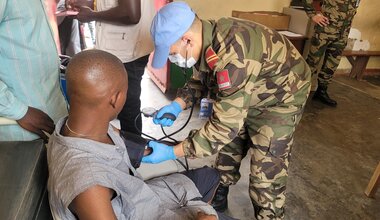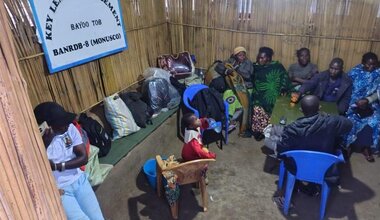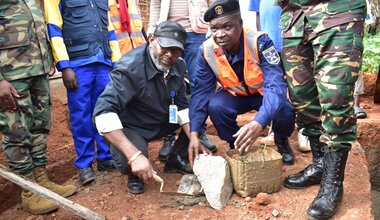MONUSCO trains media professionals on gender issues in Kinshasa

Kinshasa, 3 July 2013 – Violence against women, especially rape, is a major concern for the United Nations Organization Stabilization Mission in the Democratic Republic of Congo (MONUSCO), more so because the mission's core mandate is to protect civilians in the country.
Within the framework of that mandate, and under its strategy to combat gender-based violence, including sexual abuse, MONUSCO's Gender Unit held a "Gender and Media" training workshop for close to a hundred journalists and other media professionals in the Congolese capital Kinshasa on 3 July. The training was designed to sensitize these journalists to place gender issues at the center of their daily reporting, which in the long run will help raise public awareness on the seriousness and the urgency of fighting the scourge of sexual violence.
The workshop had three main objectives: to help the journalists to gain a better understanding of gender-related issues in peacekeeping operations; to show them how they can integrate the gender dimension into their work; and to establish a network of journalists working on gender issues.
The struggle that MONUSCO, alongside Congolese authorities, has been waging against sexual violence is beginning to bear fruit, but these results still remain well below expectations. Indeed, the DR Congo holds the sad record of being counted among nations with the highest rate of sexual violence in the world, a situation that in some circles has earned the country the title of « world's rape capital ». According to the organizers of the workshop, the highest numbers of cases of sexual violence occur in the east of the DR Congo, a region characterized by widespread instability. In 2007, for example, 12,031 incidents of rape were recorded in South Kivu province alone. Those responsible for these atrocities were armed elements belonging either to rebel groups, or to the national security and defense forces.
The documents that served as the basis for discussions in this workshop included the UN Security Council Resolution 1325, which recognizes the important role that women play in conflict prevention and resolution ; UN Resolution 2098, which extends the mandate of MONUSCO to 31 March 2014, while strengthening the mission with a Force Intervention Brigade charged with fighting armed groups in eastern DRC ; the Peace, Security and Cooperation Framework Agreement for the DR Congo and the region, which was concluded in Addis Ababa last February, and in which women are called upon to play a central role ; and finally the Congolese Government's Action Plan for the implementation of Resolution 1325.
The panelists recognized that, in order to end violence against women, women must have access to decision making positions where they can influence and help bring about new policies. Both private and public media can help to move things in that direction, including through the promotion of public awareness on issues of gender equality. « We expect you, journalists and media professionals, to place the gender issue at the heart of your work and reporting so that the population as well as policy makers are made aware of the scale of the phenomenon of sexual violence in the DR Congo, » Ms. Elsie Effange-Mbella, Senior Gender Advisor of MONUSCO said.
Penangnini Toure/MONUSCO
 UN
UN United Nations Peacekeeping
United Nations Peacekeeping





